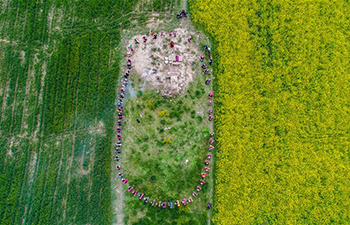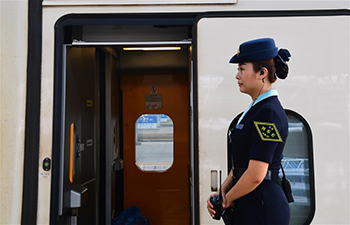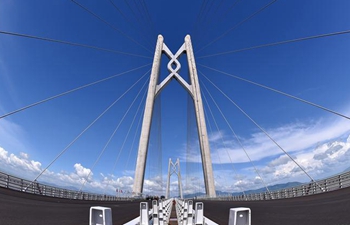GAZA, July 8 (Xinhua) -- It's been three years since Israel waged the 50-day large-scale military offensive on the Gaza Strip, but Yanis al-Masri and his family, whose home was destroyed during the war, is still living in a caravan in the northern town of Beit Hanoun.
Al-Masri was 13 when the war broke out on July 8, 2014. He still remembers how destructive the Israeli military offensive was, especially in his town close to the border area between the coastal enclave's northern tip and Israel.
"However, the last three years were the hardest," he said.
"Right at the end of the war we received money from the United Nations for a house rent, and then it stopped," said the high-school teenager. "After paying the house rent, we took refuge at schools and we moved from one school to another, until we came to live in this caravan."
The war ended on August 26 after Egypt brokered a cease-fire between Hamas and Israel, with massive damage done in the sectors of housing, infrastructure, industry and agriculture in Gaza.
In October 2014, 50 Arab and international donors pledged in Cairo 5.4 billion U.S. dollars for Gaza's reconstruction plan.
Naji Serhan, deputy housing minister in Gaza, told Xinhua that since the war in 2014, 50 percent of the world-backed construction plan has been completed, with "3,500 housing units already rebuilt and 2,000 still under construction."
According to the minister, 11,000 housing units were completely destroyed, 6,800 badly damaged, 5,700 partially damaged and 147,500 slightly damaged.
On top of the slow construction in Gaza, the coastal enclave, home to a population of more than two million, has been witnessing hard living conditions, such as a severe shortage of electricity, high rates of poverty and unemployment and even a polluted beach.
"Around 500 families are still living in caravans," said Serhan. "This is due to a deficiency of 250 million dollars that was behind a decline in the reconstruction process."
Hamza al-Masri, father of Yanis, also grumbled about their hard living conditions in the caravan.
"There is no construction; there is nothing," he said. "The caravan is not a safe place at all. There's really lots of fear and suffering."
"We hope that we can go home to have a new life and have a concrete-made house," the 58-year-old father said.
Meanwhile, in the village of Khuza'a, just east of the southern Gaza Strip city of Khan Younis, 16-year-old boy Oday Abu Motleq and his family are living in their partially destroyed house, waiting for its renovation.
"I have been living in this house since I was young. I was born here, I grew up in this house and I studied here. All my memories as I was young are in it," said the boy. "The ministry of work came and checked the house. They classified it as unfitting for living, but we are obliged to live in it."

















